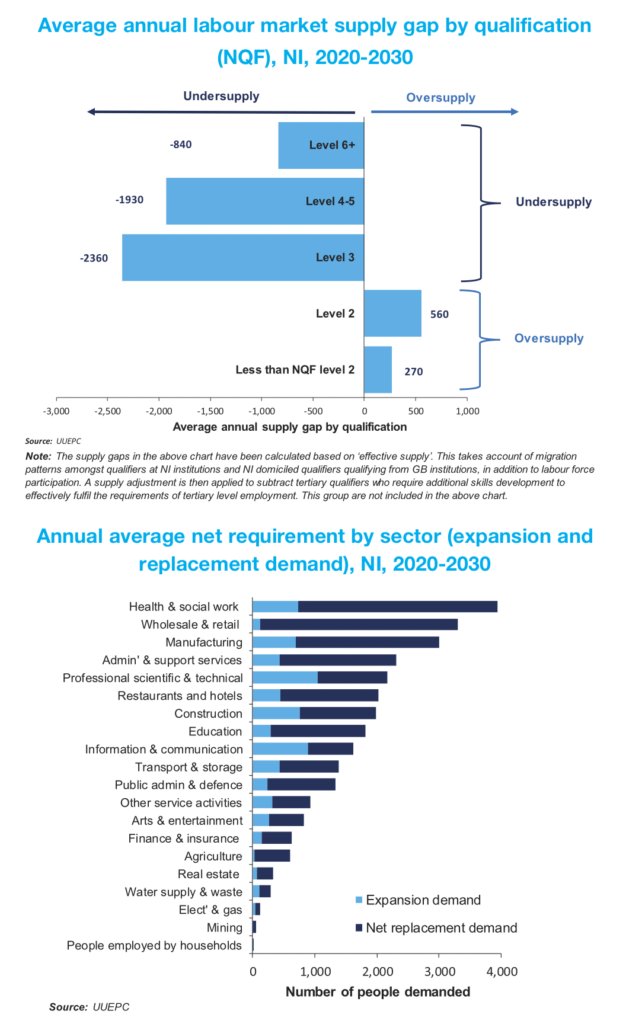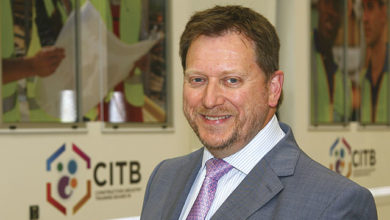Skills: A missing middle

The squeeze out of low or no skilled people from Northern Ireland’s labour market has been exacerbated by the pandemic, with employers continuing to favour highly qualified individuals.
The finding was one of a number pandemic-driven shifts in Northern Ireland’s skills demographic noted in the Department for the Economy’s Northern Ireland Skills Barometer 2021.
Restrictions in the labour market had a more adverse effect on individuals occupying roles needing lower levels of qualification, for example, in the first quarter of 2020, 22 per cent of total hours worked were accounted to individuals qualified to NQF level 2 or below, however, by the last quarter of 2021, this figure had declined to just 15 per cent. In contrast, those qualified to degree level or above registered an increase for their contribution to overall hours worked for the same period, up from 32 per cent to 41 per cent.
The appetite for highly qualified individuals appears to be influencing a trend of the education system retaining young people for longer, with a higher proportion of young people enrolling in higher level education but, notably, this trend is also creating short-term labour market supply pressures.
A post-pandemic changing mix of skill requirements has been influenced by a range of other factors, including a reduction in non-UK nationals in 2020/21. A reduction in migration flows, attributed to restrictions on international travel, has resulted in labour shortages in occupations which have been more dependent upon migrant labour in recent years.
Labour shortages have also been compounded by the highest proportion of early retirements for almost a decade. Ulster University Economic Policy Centre, from whom the Skills Barometer was commissioned by the Department, assess that an accumulation of excess savings, driven by restrictions on social activity, afforded older people greater choice and has resulted in many older workers affected by the pandemic deciding to retire early. In parallel, at the other end of the labour market spectrum, the level of economically inactive students also rose to its highest levels in almost a decade as some students suffered from a lack of opportunities during the pandemic and others withdrew their labour.
The Skills Barometer also flags a perceived emphasis being placed on the importance of ‘soft skills’ such as problem solving and attitude to work by employers, suggesting that remote working has also evoked additional skills challenges, likely to persist over the long term.
“The labour market is demanding individuals with qualifications and for the most part, the education system is producing them. However, for a region to prosper in productivity, improve living standards and compete at a global level, the labour market needs more,” the Skills Barometer report assesses, adding that collaboratively the education system, employers and policy makers must work to develop a system that sufficiently prepares talented young people to prosper within the world of work.
To 2030
A high growth economic scenario utilised by the report’s authors estimates that Northern Ireland’s employment growth rate will average 0.8 per cent per annum, meaning a forecasted additional 7,300 jobs every year, or 25,000 in the decade to 2030.
Under the scenario, higher growth rates are expected in sectors associated with higher qualification requirements. Understandably, the occupation with the largest growth over the next decade is forecast to be IT and telecommunications professionals, “directly linked to the growth of the ICT sector, and indirectly linked to an increased demand for digital skills across the wider economy”.
However, it is important to note that while growth is expected to have an influence on demand in coming years, sectors with low growth prospects, for example, the wholesale and retail sectors, will still provide plentiful supply of opportunities through natural labour market churn, as replacement demand plays a substantial role in providing employment opportunities.
Evidently, the demand for qualifications is being driven by the qualification profile within sectors and areas of strong growth which appear to be those with a high concentration of graduates. It is estimated that 37 per cent of labour demand in the coming decade will require NQF level 6+ (undergraduate degree and above). In contrast, only 8 per cent of the net requirement are demanded at NQF level 2 and below.
Supply
In terms of meeting future demand, the Skills Barometer highlights an existing shift in supply. From 2003 to 2021, the proportion of people in employment in Northern Ireland with at least an undergraduate degree has more than doubled to 38 per cent, in contrast to the stock of low-level qualifications which has halved to 15 per cent over the same period.
The replacement of older workers with lower qualification levels by younger labour market entrants with higher qualifications, as well as a sectoral shift towards higher qualification demand, is driving this shift but it has been accelerated by the pandemic, where almost all of the net decrease in employment has been recorded amongst those with lower levels of qualification, increasing the average stock of skills amongst those in employment.
The report assesses that while it is likely a return to employment of workers who lost their jobs during the pandemic will see a short-term reduction in the qualifications profile of the employed, “it is unlikely that the stock of qualifications amongst the employed will return to pre-pandemic levels as some of this labour will be permanently outside the labour force”.
Education
The past two years has seen a recognised rise in levels of retention within the education system and attainment across all levels of the education system. While this has an effect of reducing the annual flow of qualifiers into the labour market, it is most pronounced in occupations and sectors typically associated with lower levels of graduate employment. According to the Skills Barometer: “The overall supply of qualifications in Northern Ireland remains characterised by a ‘missing middle’, with relatively few mid-level skills provided by the education system which directly transition to the labour market.”
Demand and supply balance
In relation to the demand and supply imbalance, the Skills Barometer sought to identify areas of over and undersupply by NQF level and subjects in tertiary education, a summary of its findings include:
• a slight undersupply at NQF level 6+, which could be addressed by improving the employability of graduates (i.e., transversal skills and work placements);
• an undersupply of mid-level (NQF level 3-5) qualifications, reflecting a relatively small number of qualifiers at this level who transition to the labour market;
• a slight oversupply of low-level qualifications (NQF level 2 and below) over the next 10 years. However, if enrolment and attainment patterns remain at 2020/21 levels and migration flows to not return to pre-pandemic levels there is a risk of undersupply;
• a subject imbalance at HE level, with undersupply in key narrow STEM subject areas (e.g., computer science, engineering, physical and environmental sciences).
Commenting on the findings of the 2021 Skills Barometer, Economy Minister Gordon Lyons MLA says that the Barometer “clearly illustrates that investment in skills is worthwhile, leading to better employment prospects and higher earnings”.
“The Barometer outlines some clear challenges, for example, how demographic trends will create labour supply challenges over the coming decade and in doing so underpins the need for one of my key skills policy objectives to ‘create a culture of lifelong learning’. It also provides clear evidence on the digital skills challenge which we must address urgently to ensure our people and businesses can reach their potential. My officials are continuing to work with the experts from the Economic Policy Centre, representatives of business, trade unions and education institutions to ensure we develop a skills system matched to the needs of a globally competitive small, advanced economy.
“Addressing the skills imbalances is key to driving economic growth and delivering on our societal ambitions. We must ensure people are equipped to meet the changing demands of the labour market now, and in the future, as we strive to become one of the leading small economies of the world. I am confident the latest edition of the Skills Barometer will help people to make career and subject choices and in turn assist businesses as we build the pathway to a 10X economy.”






